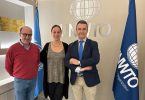Attending the second day of the symposium organized by the International Institute for Peace through Tourism (IIPT) in Johannesburg, today’s plenary with 2 speakers discussed conflicts.
Conflicts can be caused by community divides and escalate. Several specialists presented their views on this issue and how their countries overcame conflict and are in the process of healing.
HE Vincent Karega, the High Commissioner of Rwanda to South Africa who is also a former minister in Zambia spoke first, saying Rwanda is a famous post-conflict country. Their conflict culminated in a horrific genocide that killed trust and destroyed a nation, not to mention increasing the poverty. Since 1994, there is a government of national unity, and they will meet Millenium Development goals in 2015, and will shift to a middle-income country. There is a good airline, jobs, good water, and good basic education. Things are looking very good now.
Tourism has been a key pillar in rebuilding the trust. In 2006, Rwanda received 499,000 visitors, and it grew to 1.2 million last year. That’s a lot of growth in a short amount of time. The peace and security and reconciliation program are good reasons. Tourism came to consolidate peace by involving Rwanda with jobs in handicrafts, conservation efforts, etc. Wildlife protection and looking at climate change are vital aspects also. Tourism is the biggest income earner in Rwanda, more than tea and coffee and mineral exports combined. Tourism is poised to continue to grow.
Their tourism policy is not for mass tourism, but for high end, and for this, they invested a lot in hotels and infrastructure. In 1994 there were less than 600 rooms and no five star places, and now there are 6000 rooms, and two more five star hotels are opening shortly. Customer care and a school of tourism is growing and developing also. They are responsibly handling eco-tourism and conservation, as this is critical for sustainability. The national parks are areas that are centers for tourism where conservation and nature are huge elements. The genocide museums are also there for people to learn about the past so that the horrors are not repeated. He is encouraged that peace has returned to the nation, and tourism has been the key pillar.
Paul Bewsher is the Program Manager from the Peace Parks who has been involved in project management for many years, coordinating activities between countries.
Peace is one of the cornerstones of the future, and peace parks are important in the world. (Words of Nelson Mandela.) The peace parks were established around 16 years ago, and some transcend international boundaries. The vision is to create a network of protected areas that cross international borders, many places of which had serious conflict taking place. Borders are now managed as protected areas and use tourism and community development. They reinforce regional peace and stability. When you’re working together, it is difficult to be in conflict. There are huge areas along the Zambezi River that have peace parks that transcend colonial boundaries. Solutions can be found through these initiatives.
Biodiversity, business and benefits are three components that need to be in a harmonious balance. It unlocks the economic potential. There are natural and cultural resources within these areas as well, rich with history in the liberation struggle. Conversation without income is just conversation. It needs to be kept in balance, and governments working together can provide a platform for this to work.
South Africa has been hot hard by rhino poaching, as well as lions and elephants. Resource protection is looking at combatting wildlife crime. There is a component of training there too, as it cannot work without skilled people. Having skilled people in the tourism sector, with tourism and hospitality training is a component that must be addressed. Community development is crucial for sustainable projects that benefit all of a nation.
The dream of peace parks has become a reality, and those who contributed in any way, big or small, will always be remembered for their contribution.
The founding president of IIPT India is the next speaker, with 35 years in the tourism industry. Ajay Prakash believes that there haven’t been many lessons learned from past conflicts, or we would not have what is happening in Pakistan/India, the Middle East. Etc. How and when will we wake up to the fact that this is a reality we must confront? We expect somebody else to do this. Peace has to turn from a noun into a verb, or nothing will change. Since war begins in the minds of men, that is where the constructs of peace must also begin. So that comes back to each and every one of us.
There is probably no country that has not experienced conflict, but it’s just varying degrees. What is the cause? Greed, hunt for power, religion? To him, the root cause is insecurity that drives conflict. Whether fear of lack or religion of whatever. The price of war is very high. Terrorism divides- tourism unites. Every tourist is an ambassador for peace.
The solution does not lie in war. War memorials strike the wrong chord – they reinforce the negative thing that happened. People can only question the insanity of that horror. You have actually reinforced the reason or grief of that conflict, as opposed to focusing more on the hope. We need to change the way we look at past conflicts.
Something huge is the role of the media in reporting travel. There was once a terrible attack on the Taj Mahal and it was covered minute by minute. This encourages people to do terrible things to draw attention to themselves.
Sport can play a large part in reconciliation. When you see excellence on the sports field, you can do nothing but accept and acknowledge it. It brings people together as well.
You have to put the past behind you. Countries have to move on, and South Africa is a great example of how to handle post conflict integration. Darkness cannot drive out darkness. Hope is what sustained Mandela, Gandhi and King, and will sustain mankind as well. He hopes the world will join us, and the world will live as one.






















